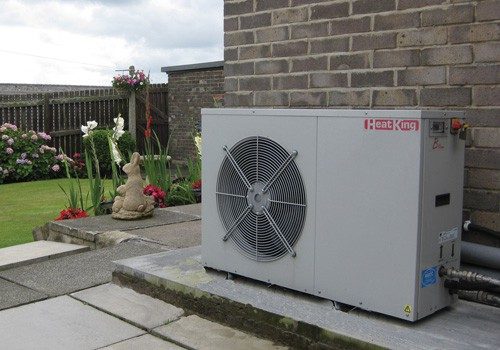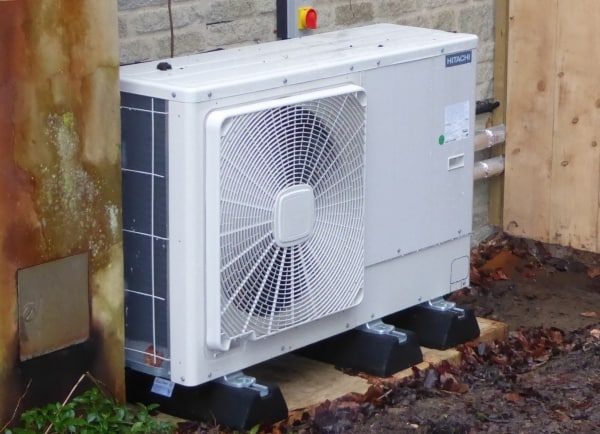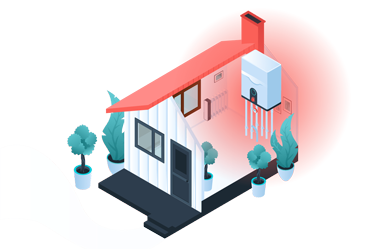What Are The Disadvantages of an Air Source Heat Pump?
Air source heat pumps are central to an eco-friendly and cost-effective heating system that also qualifies for the UK Government’s Renewable Heat Incentive. But there are some disadvantages to opting for an air source heat pump over other types of systems. In this article, we will explore these disadvantages in more detail and give you all the information you need to make an informed decision about whether an air source heating system is the right choice for you.

There is much to praise about air source heat pumps and the heating systems they power. Air source heating systems can lower your energy bills and your carbon footprint as they greatly reduce your reliance on fossil fuels.
They also cost less than most other renewable heating systems despite being able to supply you with heating and hot water just like a regular gas boiler.
But there are some disadvantages to choosing an air source heating system too and these are often overlooked by some in their enthusiasm for all the positives. But our view is that when people are making such a huge investment, they need to be in possession of all the facts.
With that in mind, this article is going to delve a little more into the disadvantages of an air source heat pump and give you all the information you need to make an informed decision.
What is an air source heat pump?
Before we look at the disadvantages of an air source heat pump, let’s be clear about exactly what an air source heat pump and an air source heating system is.
An air source heat pump is a device which sucks air in and uses it to heat up a liquid refrigerant which is then used to heat your home and your hot water.
It is the technology at the heart of an air source heating system. This system is simple but extremely effective. It is capable of heating radiators and a hot water cylinder just using the air source pump and a small amount of electricity.
An air Source heating systems can do everything a traditional gas boiler can with the added advantage of being extremely eco-friendly. It does use a little electricity but will still greatly reduce your carbon footprint and if you have a green electricity source such as a solar panel or a wind turbine, it has the potential to be totally carbon neutral.
How does an air source heat pump work?
An air source heat pump looks a bit like an air conditioning unit. It is fitted to the back or side of your home and is not necessarily a very attractive item. But the process it performs is both simple and extremely effective. This process can be summarized in five simple steps:
- The air source heat pump sucks in air from outside. It uses this air to heat a liquid refrigerant using a process a bit like a reverse refrigerator.
- The pump, powered by a small amount of electricity, compresses this liquid to increase its temperature.
- It then condenses back into a liquid in a process that releases the stored heat.
- This heated liquid is then pushed around your radiators or underfloor heating system to heat your home.
- Any excess heat will be used to power a hot water cylinder providing enough hot water for washing and showering.
What are the advantages of an air source heat pump?
There are plenty of advantages to using an air source heat pump which is why they have quickly become one of the most popular green heating solutions. These can be briefly summarized as follows:
- Eco-friendly – Air source heating systems are eco-friendly and leave a far lower carbon footprint than traditional gas or LPG boilers.
- Cheaper than eco alternatives – compared to other eco-friendly heating systems, such as ground source heating systems, an air source heat pump is cheap to buy.
- Easy Installation –An air source heat pump is easier to install than other environmentally-friendly heating systems. This means they have lower installation costs as well.
- Lower running costs – An air source heating system has substantially lower running costs less to run than a traditional gas boiler meaning you can be sure your energy bills will be lower.
- Eligible for the Renewable Heating Incentive – The government will pay you a fixed rate for every kW of energy you generate in your home using an air source heat pump. That means you can save even more money.
Many of these advantages are well known and widely promoted by manufacturers. But the disadvantages of an air source heating system are far less well known. We believe everyone investing in a new technology deserves to know the downsides as well as the upsides, so let’s take a look at the main disadvantages in a little more detail.
The disadvantages of an air source heating system
There are five main disadvantages to using an air source heating system
- Noise – The condensers contained in the outside unit of an air source heating system can be noisy. The level of noise they generate shouldn’t be sufficient to be heard inside the house unless it is close to an open window, but if you are in the garden close to the unit, the noise could disturb you. If the unit is close to a neighbouring property it could also be a problem for them too.
- Cold air – The condensers will also blow out cold air. Again, if you are close to the outside unit, this could be an annoyance. Don’t put the unit next to your garden furniture or BBQ.
- Electricity – An air source heating system does use some electricity. This means it will add to your electricity bill. It also means your air source heating system cannot be totally carbon-free system unless you also generate electricity from a renewable source.
- Levels of heat – Some users have reported that air source heating systems do not generate as much heat as traditional systems. This can mean there is a need for larger radiators in some properties, especially if you have larger rooms. Some air source heating systems will specify that they work best with an underfloor heating system.
- Upfront costs – The biggest downside to an air source heat pump is also an upside; the upfront costs. While they are substantially cheaper than other renewable heating solutions, especially when installation is taken into account, an air source heat pump will still cost substantially more than a gas boiler. We will come back to this downside further down the article.
Different types of Air Source Heating Systems

There are two different sorts of air source heating systems. They use the same technology but create their heat in different ways and also come with different disadvantages:
- Air-to-water heating system – This uses an air source heat pump to generate heat and uses it to push hot water around a traditional or underfloor heating system and to generate hot water. The main downsides are those listed above but in particular the lack of heat in some homes.
- Air-to-air heating system – This system also uses an air source heat pump but it generates heat in the form of warm air which is then pushed out into your home using fans. Downsides to this system include that it cannot be used with underfloor heating and is not able to generate hot water.
How much electricity does an Air Source Heating System use?
For those keen on an eco-friendly heating system, the fact that an air source heating system requires electricity will be the principal disadvantage.
There is no escaping this fact but it is worth noting that air source heating systems are still far more energy efficient than some of their alternatives.
To work out exactly how much more efficient, you will need to look at a systems SCOP rating. SCOP stands for Seasonal Coefficient of Performance. It measures how many kW of heat a system can generate for every 1kW of electricity.
If you buy an air source heating system with an SCOP rating of 3.4, that means for every 1kW of electricity it uses, your air source heating system can generate 3.4kW of heat.
The average SCOP rating for an air source heating system is actually 3.4. This is not as high as some other green heating systems but is still a vast improvement on a traditional gas or LPG boiler-powered system.
The big disadvantage – up-front costs
For many people, price will be the main determining factor in choosing a new heating system. Unfortunately, on price, an air source heat pump actually creates a big dilemma.
If you are determined to invest in an eco-friendly system, an air source heat system is the most affordable option.
A good-quality air source heating system will cost £7,000 on average. With installation costs added on too, you can expect to pay between £10-12,000 altogether. In comparison to other green alternatives, this is far cheaper:
- Air source heating system – £10-12,000
- Biomass boiler – £15-20,000
- Ground source heat pump – £14-20,000
The problem is that for many people £10-12,000 is still an awful lot of money and when you compare the price to a regular combi gas boiler, the difference is stark:
- Air source heating system – £10-12,000
- Regular combi gas boiler – £1,500–3,500
Upfront costs are not the only financial consideration when buying a heating system. Running costs also need to be factored in.
A typical new gas combi boiler costs around £900-1,000 a year to run. An air source heating system with an average SCOP of 3.4 will cost something in the region of £700 a year to run.
That means you will save £200-300 a year on your heating costs with an air source heating system. You will also get money back from the Government’s Renewable Heating Incentive scheme.
The current Renewable Heating Incentive tariff for air source heating systems is 10.71p per kW. This is less than some other renewable systems but will still amount to quite a considerable amount of money over the lifetime of your system.
Add all this together and the chances are that over its lifetime, an air source heating system will end up costing you less than a gas boiler.
But this doesn’t change that fact that a lot of people cannot afford to pay £10-12,000 upfront for a new heating system. They are quite simply priced out of the most affordable renewable heating system available.
Is there a way to be eco-friendly for less?
If you fall into this category, there is a simple solution. Buy a new energy-efficient gas boiler. Obviously, this is not nearly as eco-friendly as an air source heating system, but a new gas boiler can still help you reduce your carbon footprint quite significantly.
Modern gas and LPG boilers are much more energy-efficient than they used to be. If you are replacing an old boiler in your home with a new one, you are likely to be reducing the amount of carbon you are generating significantly. You cannot be carbon-free with a gas boiler but you can still make a difference.
If you combine a modern eco-friendly boiler with a smart thermostat that allows you to manage your heating systems remotely to reduce energy waste more, you can be even more energy-efficient and save money while still using a gas boiler.
How to get a cheap energy-efficient gas boiler with low installation costs
If you decide a new, energy efficient gas boiler is the best option to suit your budget, then there are some great ways to buy a high-quality boiler at the lowest possible prices and make big savings on installation costs too.
National and local installers will always charge a premium, but to get the best possible prices, we recommend using an online installer like HEATABLE.
HEATABLE is a 100% online operation and that means it lacks the expensive overheads and marketing budgets of traditional installers. As a national company, it can still negotiate great deals with manufacturers and low overheads means these savings can be passed onto their customers.
If you want to find out the sort of prices HEATABLE can offer, just head over to their website. You can fill in their online form and, without sharing any personal information, they will give you a fixed-price quote for a range of high-quality boilers to suit your property.
HEATABLE has lots of brands to choose from include highly-rated models from manufacturers like Worcester Bosch, Viessmann, and Baxi.
If that doesn’t sound attractive enough, HEATABLE also offers a great range of extended warranties on a number of top boilers from manufacturers with up to ten years of coverage available on some models.
There are also finance deals available that will let you spread the payments for your boiler over 3, 5, 7, or even 10 years. With a standard APR is just 9.9% and regular 0% APR offers available too, HEATABLE has the price plan and the boilers to suit any everyone.
Don’t just take our word for it
If you want to know how HEATABLE actually performs, you have to look no further than their online reviews.
On the HEATABLE website there are more than 500 5* ratings online. Or visit TrustPilot, where HEATABLE boasts an impressive 4.7/5 score and 95% of customers have rated their service as either good or excellent.
HEATABLE’s business model, low prices, and excellent service have turned the boiler installation industry on its head and the people who are benefiting most are its thousands of satisfied customers.
Summary
There are plenty of advantages to using an air source heat pump to heat your home. But there are also a few disadvantages that can be overlooked.
The main disadvantage is the upfront cost. While it is cheaper than other eco-friendly heating systems, an air source heating system still costs substantially more than a gas or LPG powered boiler.
In this article, we have explained the main differences and also outlined all of the main advantages and disadvantages for you. We have talked about how you can make your heating system greener without having to fork out a five-figure sum upfront and recommended the best place to get an energy-efficient gas boiler for less today.
Have you got an air source heating system? What have you found to be the main disadvantages? Do you have any tips or advice for other readers thinking of buying one? User feedback is always helpful for our readers and us, so do share your thoughts using the comment box below.
